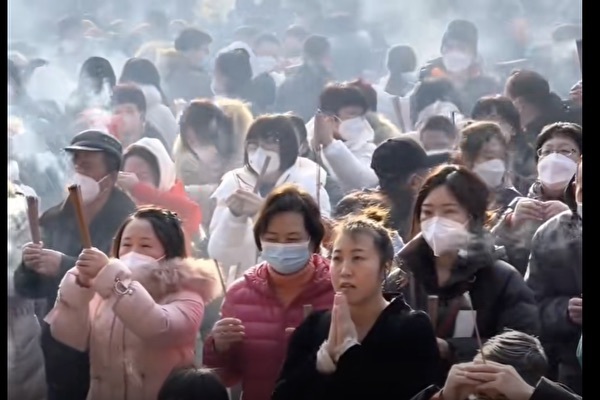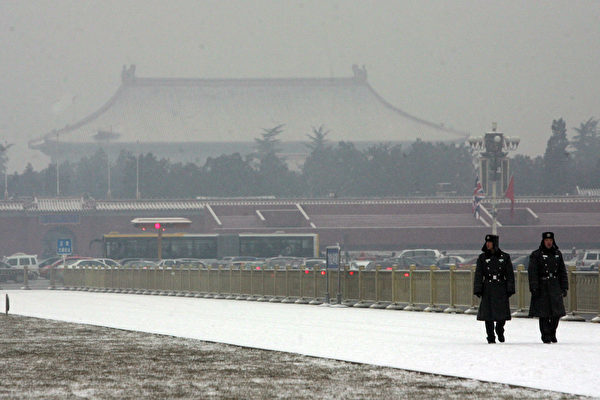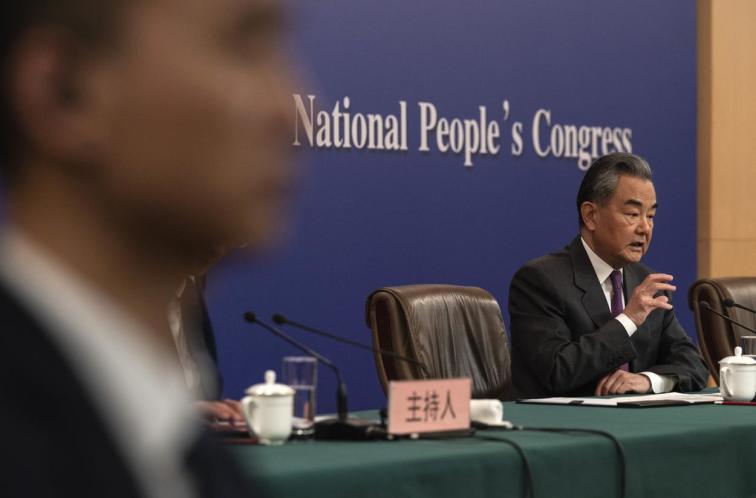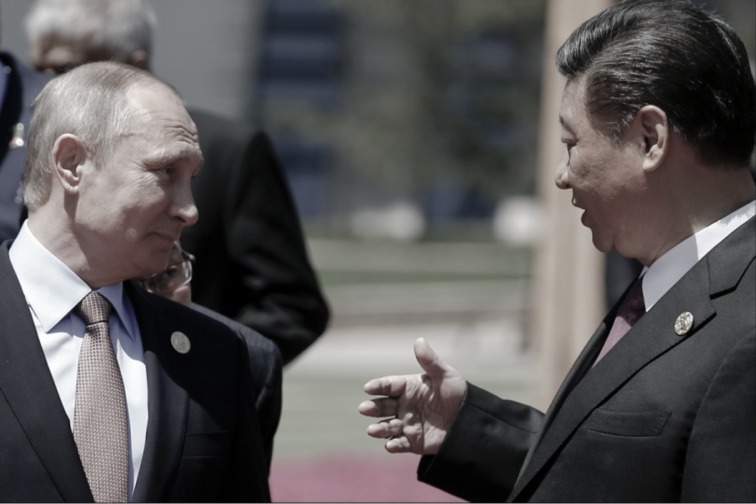The term "CCTV" (China Central Television), you know what it implies. (Screenshot from the internet)
[People News] The harsh winds of China's economic winter are growing stronger, bringing widespread layoffs, factory closures, civil servant salary cuts, ghost buildings in first- and second-tier cities, and ghost towns across third- and fourth-tier regions. Every industry is suffering a severe depression, with widespread devastation. Now, this cold wave has reached the CCP's propaganda system, affecting the core media stronghold of the capital, Beijing.
Recently, some Chinese media reported that Beijing Television Station (BTV) is in financial distress, with several channels facing closure and the station teetering on the brink of bankruptcy. Among the channels expected to shut down are BTV's Life Channel, Documentary Channel, and Youth Channel, leaving nearly a thousand employees facing unemployment in 2025, joining the growing wave of jobless workers.
The broadcasting and television industry was once a prestigious sector in China, considered a stable "iron rice bowl" under the public service system. Media has been the CCP's frontline in controlling public opinion, and the Party has historically prioritized funding radio and television. One or two decades ago, prominent hosts and celebrities in the CCP's broadcasting system enjoyed popularity rivaling that of movie and sports stars. This wasn't merely due to their talent, but also to the operational model behind the television system, which combined generous state funding with the ability to sell channel resources and generate significant revenue from advertisements. For example, the China Central Television (CCTV) network's prime-time advertising revenue alone amounted to billions of yuan annually, far outpacing state-owned enterprises that often operated at a loss behind the scenes. While amassing wealth, TV stations also became playgrounds for high-ranking officials. CCTV served as a personal "harem" for figures like Jiang Zemin and Zhou Yongkang, while Dalian Television Station became Bo Xilai's private fiefdom. Back then, working at a television station was a dream job for college graduates, and the ultimate stage for young people aspiring to become stars.
In recent years, however, the situation has drastically reversed, and the dream is over. The broadcasting industry has not been spared from the economic downturn. Delayed wages, channel closures, and salary cuts are no longer surprising topics.
According to data from the National Radio and Television Administration, as of March 2024, a total of 144 television channels and 52 radio frequencies nationwide had been shut down, with the trend continuing to expand. Chinese media reported that before the pandemic, channel reductions mainly affected city-level television stations. Since 2020, provincial-level television stations have also begun cutting channels.
In August of last year, Dajiyuan cited a Sohu account article by "Xiao Long Ai Lao Ke," reporting that county-level television stations in mainland China are experiencing an unprecedented crisis, with large-scale closures likely. By the end of 2023, nearly 700 county-level television stations had ceased broadcasting or closed. Currently, approximately 2,000 county-level stations across China face the risk of shutting down.
An article by the Beijing News Media Research Institute titled "How Difficult Is Life for TV Stations?" revealed that on August 10, 2024, Shenzhen Television Station’s Public and Entertainment Channels, which were established in the 1990s, announced their closure. Before this, Beijing Media Digital Television Co. shut down channels like "Beijing Theater," "Dynamic Music," "Chess Chronicles," and "Real Estate." The Tianjin Broadcasting Television Station simultaneously shut down six channels, including International Channel, HD Boxing, and several lifestyle channels. Additionally, many channels were merged—Zhejiang Broadcasting Television combined its Film & Entertainment Channel with its Education & Technology Channel into the "Education & Film Channel," while Shanghai Broadcasting Television merged its Entertainment and Xing Shang Channels into the "Urban Channel" and integrated its Cartoon and Children’s Channels into "Haha Xuan Dong Satellite TV."
Why Are Television Stations Struggling So Much? There are two main reasons for this decline: plummeting viewership and rapidly decreasing profitability.
According to the "2024 China Smart TV Interaction Trends Report" released by the Qianzhan Industry Research Institute, since 2016, the daily average power-on rate for TVs in China has dropped sharply, from 70% to less than 30% by 2022. This decline in usage and viewership directly impacts revenue, leading to reduced wages for industry workers. Data from the National Radio and Television Administration's annual "National Broadcasting and Television Industry Statistical Bulletin" shows that television advertising revenue nationwide fell from 111.9 billion yuan in 2013 to 58.36 billion yuan in 2023, nearly halving over ten years and even lower than the 79.7 billion yuan recorded in 2010.
Why Are Viewership Numbers Declining? State media research institutions within the CCP attribute this decline to outdated practices. They argue that the broadcasting system's golden generation of talent, mostly born in the 1970s, has not adapted to the innovations of internet platforms. With outdated technology and ideas, their programs fail to attract audiences and cannot compete with short videos and new media formats.
However, this explanation only scratches the surface and avoids deeper issues. Western television networks, many with decades of history, have also faced competition from new media but have not reached the point of collapse. Talent can adapt and innovate with time. The key issue lies in the CCP-controlled media system itself, which functions as the Party’s propaganda mouthpiece. Its primary skill is deception—constantly bombarding citizens with propaganda has worn people down. Turn on the news channel, and it’s filled with praise for the Party, criticisms of the West, and endless falsehoods. Other channels either charge exorbitant fees, sell fake or substandard products, or feature so-called "experts" exploiting social issues. Before the rise of telecom scams in northern Myanmar, Chinese television stations were arguably the country’s most infamous "telefraud" networks. The further up the hierarchy, the worse it gets—CCTV hosts like Chen Meng have been accused of spreading lies, Li Ruiying of using sexualized appeals, Zhu Jun of sexual assault, and Zhao Benshan of selling fake medicines. This endless stream of scandals has alienated viewers.
As China's economy slows, financial struggles pile on—just like a leaking roof during a continuous downpour. Government debt is mounting, civil servants are not getting paid, and struggling enterprises are even less likely to have money for TV advertisements. With viewership plummeting, spending on ads would simply be throwing money away.
Public data reveals that Beijing’s general public budget revenue for 2024 reached 637.27 billion yuan, an increase of 3.1%, while expenditures hit 839.65 billion yuan, up 5.3%, clearly expanding the fiscal deficit. Most of Beijing's budget revenue still comes from tax income, which is relatively stable, but even so, it cannot sustain Beijing Television Station. The situation in other provinces is even worse.
According to The Wall Street Journal, local governments across China are heavily indebted. After years of rapid growth, China's real estate market has accumulated up to 90 million empty homes. Assuming three people per household, these homes could accommodate the entire population of Brazil. With housing prices in major cities falling for 17 consecutive months, the value of these properties continues to depreciate each month. As the real estate sector collapses, local governments lose a critical source of revenue.
The report further states that cities nationwide are facing cash shortages and sinking deeper into debt, with liabilities reaching trillions of yuan. Research by the Rhodium Group found that among nearly 2,900 local government financing platforms evaluated in 2023, only one-fifth had sufficient cash to cover short-term debts and interest payments.
Economists in mainland China have disclosed that local governments owe enterprises a staggering 12 trillion yuan. In a press briefing last October, Chinese Finance Minister Lan Fo’an stated that the central government allocated 1.2 trillion yuan to help local governments repay their debts to businesses. However, this amount only covers about 10% of the total arrears. Even with this funding, there’s no guarantee local governments will use it to pay businesses. The government often behaves like a "deadbeat debtor," refusing to settle debts with enterprises, which themselves are on the brink of survival and have no capacity to invest in television advertising.
The widespread downsizing of television stations threatens the livelihoods of propaganda leaders like Cai Qi. At the National Propaganda Ministers' Meeting in early January, Cai Qi emphatically declared the importance of maintaining the narrative of China's economic optimism. However, the dire situation at Beijing Television Station undermines his confidence, delivering an embarrassing blow to his rhetoric. On January 9, the Politburo Standing Committee meeting's official report subtly criticized the Central Secretariat, which Cai Qi oversees. Meanwhile, the Trump team reportedly suggested Cai Qi as a point of contact for U.S.-China presidential communications. However, Xi Jinping rejected the idea outright. This strategic move by Trump’s team was a clever way to test the waters of internal power struggles within Zhongnanhai. Cai Qi’s fortunes in the Year of the Snake are looking increasingly uncertain.
(Originally published by People News)











News magazine bootstrap themes!
I like this themes, fast loading and look profesional
Thank you Carlos!
You're welcome!
Please support me with give positive rating!
Yes Sure!